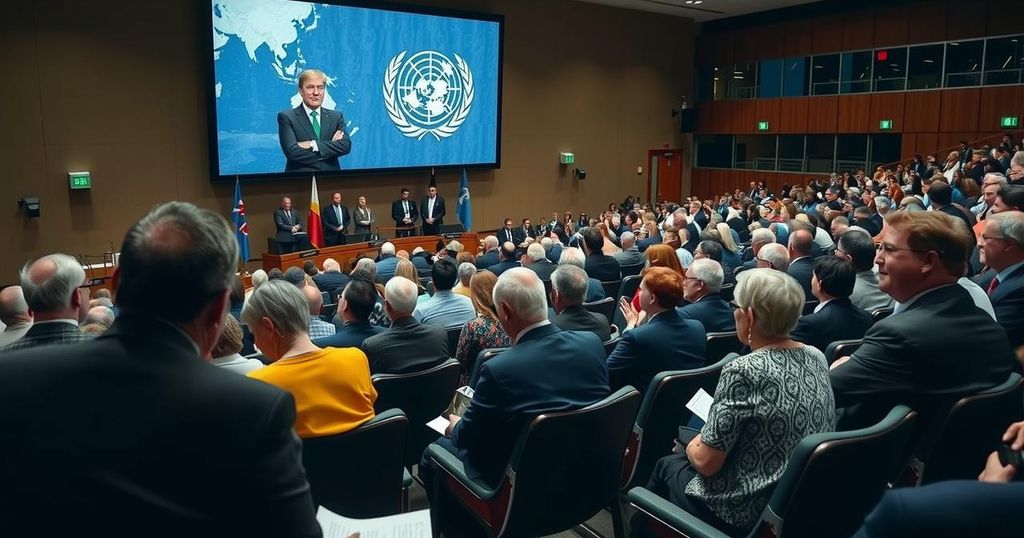The COP29 climate conference in Baku, Azerbaijan, is marked by the absence of key leaders from the world’s top polluting nations, raising concerns about political commitment to climate action. UN officials underscore the urgent need for climate finance, while host President Ilham Aliyev faces criticism over his country’s fossil fuel dependency. Despite some representation from vulnerable nations, the absence of major powers during negotiations is notable as the urgency for effective climate strategies becomes increasingly clear.
World leaders are gathering at the United Nations annual climate conference in Baku, Azerbaijan, yet prominent figures from major polluting nations are conspicuously absent. Unlike previous climate summits, this event lacks the star power typically associated with such gatherings. Leaders from the world’s top 13 carbon-emitting countries, responsible for over 70% of global emissions, are missing. Nations such as China, the United States, India, and Indonesia, which collectively represent over 42% of the global population, have opted not to send their foremost representatives. “It’s symptomatic of the lack of political will to act. There’s no sense of urgency,” stated climate scientist Bill Hare, reflecting the gravity of the situation. The urgency surrounding climate change has been underscored by unprecedented weather phenomena and record-breaking temperatures. United Nations Secretary-General Antonio Guterres emphasized, despite the circumstances, that a shift towards clean energy is inevitable and beyond any single entity’s control. From 2016 to the present, global clean energy capacity has seen significant growth, with solar and wind power becoming ever more crucial to energy strategies. Azerbaijan’s President Ilham Aliyev commenced the conference with remarks criticizing Armenia, various Western media outlets, and environmental activists, claiming it unfair to categorize Azerbaijan as a “petrostate” given its modest oil production. He suggested that natural resources should not be vilified, asserting, “Countries should not be blamed for having them… and should not be blamed for bringing these resources to the market because the market needs them.” Although Aliyev and leaders from the United Kingdom and Turkey headline the conference, the lack of influential representatives from significant nations is noticeable. However, there are still strong contingents from climate-vulnerable nations, particularly small island states and several African countries. Logistically, the simultaneous G20 meeting in Brazil has deterred attendance from numerous powerful leaders. Additional factors, including political instability in some nations and personal health issues, have further contributed to their absence. At the heart of the climate talks is the crucial issue of climate finance, aimed at securing funding from wealthy nations to assist poorer countries in their transitions toward sustainable economies. Secretary-General Guterres emphasized, “A deal is a must,” urging that developing nations should secure substantial commitments during this summit.
The annual United Nations climate conference, known as COP, serves as a crucial platform for global leaders to address climate change issues through policy discussions and negotiations. The absence of prominent world leaders at this year’s COP29 in Azerbaijan highlights a worrying trend of diminished political commitment to actionable climate strategies. This conference occurs in the context of rising global temperatures and increased frequency of climate-related disasters, making the need for decisive action more urgent than ever. Climate financing remains a pivotal topic since it involves transferring monetary resources from developed to developing nations, which is vital for supporting green transitions and recovery from climate impacts.
The apparent lack of participation from leading global powers at COP29 raises concerns about the political will to combat climate change effectively. The meeting emphasizes urgent climate finance negotiations as affluent nations are urged to assist poorer countries in their environmental transformations. The statements and presentations during this conference convey a critical message to the international community about the necessity for concrete action and accountability in addressing climate challenges. As COP29 unfolds, it remains imperative that developing nations leave with tangible commitments that reinforce their capacity to respond to climate change.
Original Source: www.voanews.com







